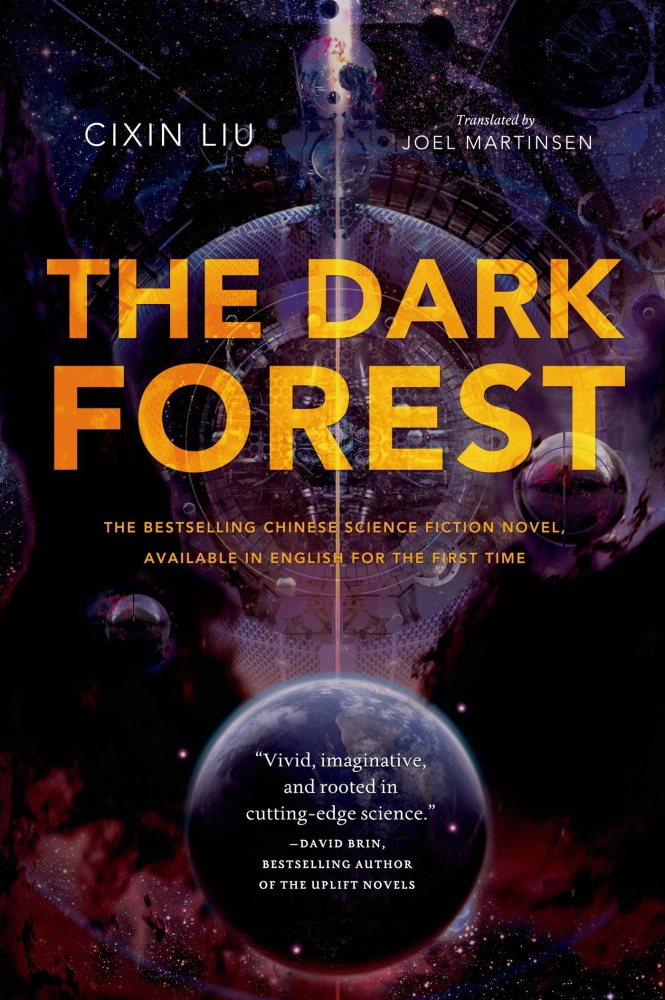Like its predecessor “The Three-Body Problem,” Cixin Liu’s sci-fi novel “The Dark Forest” blows my mind with its big-picture storytelling, hard-science speculation and fiendish conundrums that confront mere mortal humans.
By the end of the earlier novel, humanity has learned that aliens from the dying world of Trisolaris (Alpha Centauri) have dampened scientific progress on Earth, are spying on humans and are headed here with a force to exterminate people. At the beginning of “The Dark Forest,” the Trisolarians learn that humans can conceal their thoughts and deceive, qualities that are unnatural behaviors to these aliens.
Many humans have succumbed to Escapism, the belief that only leaving the Earth can save humanity. But others are making plans to fight the Trisolarians when they arrive in 400 years. A mysterious international coalition picks four Wallfacers – humans given extraordinary powers and resources to devise defenses and attacks, and the injunction to disguise, misdirect and deceive, keeping their true strategies to themselves. Two are national leaders and military planners, the third a leading scientist, no surprise.
But the fourth is a wild card: Luo Ji, a middling Chinese astronomy scholar, as shocked as everyone else by his appointment. The Trisolarians respond, through human allies, by assigning Wallbreakers to out the Wallfacers’ secret strategies.
With his macrohistories and dialectics, Cixin Liu’s work often reads like Golden Age science fiction; “The Dark Forest” includes direct references to Isaac Asimov’s Foundation trilogy and Arthur C. Clarke’s “2001.”
But Luo Ji somehow wandered in here from a Haruki Murakami novel. A slacker and hedonist (but, we learn, also a dreamer and original thinker), he declines the Wallfacer responsibility, only to learn everyone believes his declination is a strategy. He also realizes, after surviving several assassination attempts, that he is the one Wallfacer that the Trisolarians truly fear. Fortunately, he’s protected by one of my favorite characters from “The Three-Body Problem,” the sharp-eyed, gruffly friendly former police detective Shi Qiang.
Earlier in his life, Luo Ji dated a writer of young-adult novels, who asked him to write one for her as a present. He became so absorbed in imagining the character and reality of a beautiful young woman that she seemed to come to life for him. This dreamlike episode goes on to influence the rest of his life.
Author Cixin Liu was born in 1963, not long after Mao’s ironically named Great Leap Forward, so it might not surprise a reader that “The Dark Forest” dramatizes struggles among its Chinese characters over right thinking. But the question of pessimism or optimism also preoccupies other humans, even a Wallfacer who instigates medical research leading to the possibility of brain tinkering that can mandate a positive outlook.
Political officer Zhang Beihai is charged with rooting out defeatists but also pursues a long-term strategy of his own. To a starship officer, he says bleakly, “There are no permanent enemies or comrades, only permanent duty.” In one chilling sequence, he plans, tests and pulls off a perfect in-space execution that looks like an accident – to influence a key decision in the long-range future of the space program.
Humanity pours resources into developing space fleets. An impressive contingent of warships zooms out to meet a single Trisolarian probe arriving two centuries before the invaders. The consequences for humans are sobering. But Luo Ji, the reluctant Wallfacer, pondering cryptic words spoken to him long ago, has not made his final move in this deadly game.
Translator Joel Martinsen includes judicious footnotes explaining Chinese cultural and historical references, which might be unfamiliar to typical Western readers, and astronomical phenomena.
Send questions/comments to the editors.


